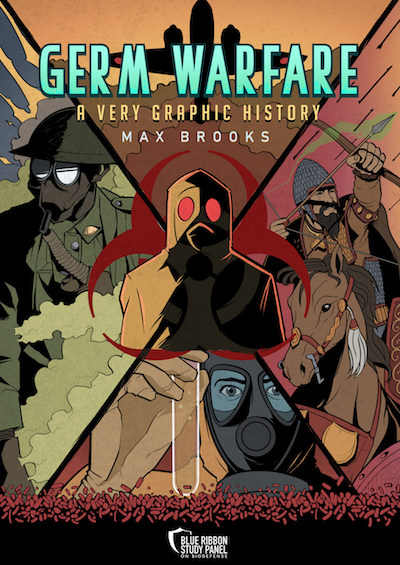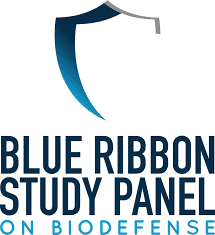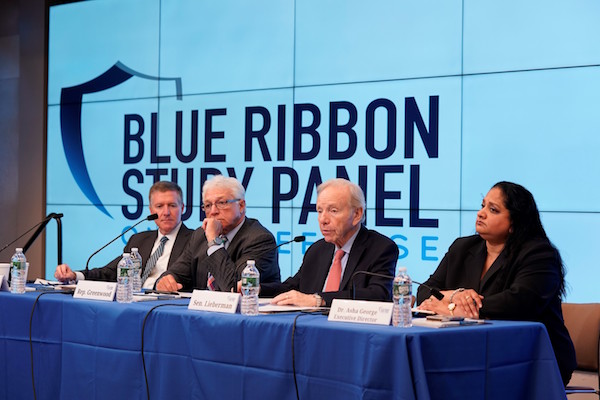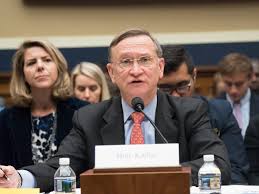Blue Ribbon Study Panel on Biodefense
See the following -
Experts Warn Of Antimicrobial Resistance, Additional Threats To National Biosecurity
 Dr. Asha George...was among a panel of experts testifying about the state of U.S. preparedness for biological attacks and infectious disease pandemics. The experts agreed that a range of factors affect our country's ability to fight these threats, including weakened or fragmented federal oversight, limited incentives for research and development, and a lack of preparedness at the local level to protect vulnerable populations. "In short, the nation is not prepared for biological outbreaks, acts of bioterrorism, biological warfare of accidental releases with catastrophic consequences," George said. "We are talking about catastrophic events that affect the function of our entire society."
Dr. Asha George...was among a panel of experts testifying about the state of U.S. preparedness for biological attacks and infectious disease pandemics. The experts agreed that a range of factors affect our country's ability to fight these threats, including weakened or fragmented federal oversight, limited incentives for research and development, and a lack of preparedness at the local level to protect vulnerable populations. "In short, the nation is not prepared for biological outbreaks, acts of bioterrorism, biological warfare of accidental releases with catastrophic consequences," George said. "We are talking about catastrophic events that affect the function of our entire society."
- Login to post comments
A 'Very Graphic History' Of Germ Warfare
 Max Brooks, best-selling author of "World War Z" and non-resident fellow at the Modern War Institute at West Point, has partnered with the Blue Ribbon Study Panel on Biodefense to produce GERM WARFARE: A Very Graphic History. This highly stylized and engaging graphic novel, set for release this Saturday, depicts previous biological warfare events, the possibilities for the future, and the continued need for public health security. This is part of an effort by the bipartisan Panel to educate the public about biological risks and why a strong biodefense enterprise is critical to the health and security of the Nation.
Max Brooks, best-selling author of "World War Z" and non-resident fellow at the Modern War Institute at West Point, has partnered with the Blue Ribbon Study Panel on Biodefense to produce GERM WARFARE: A Very Graphic History. This highly stylized and engaging graphic novel, set for release this Saturday, depicts previous biological warfare events, the possibilities for the future, and the continued need for public health security. This is part of an effort by the bipartisan Panel to educate the public about biological risks and why a strong biodefense enterprise is critical to the health and security of the Nation.
- Login to post comments
Biodefense Takes Center Stage at House Oversight Hearing
 Is the nation ready to defend against antibiotic-resistant diseases or bioterrorism? What would the response to a biological attack or disease pandemic look like? Those threats and the collaboration of private, federal and local agencies to respond to them were the focus of a hearing Wednesday in the House Oversight Subcommittee on National Security on biodefense preparedness. Congressman Stephen Lynch, D-Mass., said at the beginning of the hearing that around 2.4 million people could die in high-income countries between 2015 and 2050 without an effort to contain antimicrobial resistance, according to an April report to the Secretary-General of the United Nations.
Is the nation ready to defend against antibiotic-resistant diseases or bioterrorism? What would the response to a biological attack or disease pandemic look like? Those threats and the collaboration of private, federal and local agencies to respond to them were the focus of a hearing Wednesday in the House Oversight Subcommittee on National Security on biodefense preparedness. Congressman Stephen Lynch, D-Mass., said at the beginning of the hearing that around 2.4 million people could die in high-income countries between 2015 and 2050 without an effort to contain antimicrobial resistance, according to an April report to the Secretary-General of the United Nations.
- Login to post comments
Blue Ribbon Study Panel on Biodefense Calls for Action to Support SLTT Response to Biological Events
 America's hometown heroes are on the front line when responding to biological incidents. These include health care providers, public health professionals, EMTs, firefighters and police. But a new report from the Blue Ribbon Study Panel on Biodefense says the thousands of first responders at state, local, tribal, and territorial (SLTT) governments that form the backbone of our nation will have to fend for themselves for far too long until federal assets arrive to assist with response. Holding the Line on Biodefense: State, Local, Tribal, and Territorial Reinforcements Needed recommends eight key steps that will increase the capability of the SLTT public and private sectors to share with the federal government the burden of preparing for, responding to, and recovering from large-scale biological events.
America's hometown heroes are on the front line when responding to biological incidents. These include health care providers, public health professionals, EMTs, firefighters and police. But a new report from the Blue Ribbon Study Panel on Biodefense says the thousands of first responders at state, local, tribal, and territorial (SLTT) governments that form the backbone of our nation will have to fend for themselves for far too long until federal assets arrive to assist with response. Holding the Line on Biodefense: State, Local, Tribal, and Territorial Reinforcements Needed recommends eight key steps that will increase the capability of the SLTT public and private sectors to share with the federal government the burden of preparing for, responding to, and recovering from large-scale biological events.
- Login to post comments
Blue Ribbon Study Panel On Biodefense Receives $2.5 Million Grant To Reduce Risk of Catastrophic Bioweapon Disease Outbreaks
 The Blue Ribbon Study Panel on Biodefense announced today a $2.5 million grant from the Open Philanthropy Project. The grant allows the Panel to continue its leadership role in assessing our nation’s biodefense, issuing recommendations and advocating for their implementation, and identifying viable avenues for needed change to policy. The grant comes amidst heightened global tensions as North Korea and other regimes seek to develop biological weapons. It also arrives on the 100th anniversary of a catastrophic influenza pandemic that took the lives of millions around the world, a stark reminder of the dangers of biological events.
The Blue Ribbon Study Panel on Biodefense announced today a $2.5 million grant from the Open Philanthropy Project. The grant allows the Panel to continue its leadership role in assessing our nation’s biodefense, issuing recommendations and advocating for their implementation, and identifying viable avenues for needed change to policy. The grant comes amidst heightened global tensions as North Korea and other regimes seek to develop biological weapons. It also arrives on the 100th anniversary of a catastrophic influenza pandemic that took the lives of millions around the world, a stark reminder of the dangers of biological events.
- Login to post comments
Blue Ribbon Study Panel Recognizes National Security Strategy, Calls for Comprehensive Approach
 Senator Joseph Lieberman and Governor Tom Ridge, the co-chairs of the Blue Ribbon Study Panel on Biodefense, today addressed the newly updated U.S. National Security Strategy and the emphasis it places on combatting biological threats to the country. “With the release of the National Security Strategy, the Administration is sending a strong message to our enemies that America takes the biological threat seriously,” said Sen. Lieberman and Gov. Ridge.
Senator Joseph Lieberman and Governor Tom Ridge, the co-chairs of the Blue Ribbon Study Panel on Biodefense, today addressed the newly updated U.S. National Security Strategy and the emphasis it places on combatting biological threats to the country. “With the release of the National Security Strategy, the Administration is sending a strong message to our enemies that America takes the biological threat seriously,” said Sen. Lieberman and Gov. Ridge.
- Login to post comments
Congress Passes Legislation Authorizing Critical Biodefense Programs
 The House yesterday passed the Pandemic and All-Hazards Preparedness and Advancing Innovation Act. The bill reauthorizes existing statute governing public health efforts at the Department of Health and Human Services. Additions made by the bill - some of which were recommended by the Blue Ribbon Study Panel on Biodefense - address biodetection, hospital preparedness, medical countermeasures and response. Many of these programs will enable HHS to better defend the nation against biological threats. Both chambers of Congress have passed the bill, and it will now go to President Trump for signature.
The House yesterday passed the Pandemic and All-Hazards Preparedness and Advancing Innovation Act. The bill reauthorizes existing statute governing public health efforts at the Department of Health and Human Services. Additions made by the bill - some of which were recommended by the Blue Ribbon Study Panel on Biodefense - address biodetection, hospital preparedness, medical countermeasures and response. Many of these programs will enable HHS to better defend the nation against biological threats. Both chambers of Congress have passed the bill, and it will now go to President Trump for signature.
- Login to post comments
Experts support a future Manhattan Project for Biodefense to thwart new threats
 An effort similar to the Manhattan Project - in which American-led R&D produced the first nuclear weapons during World War II - is needed now in defense against the growing global threats posed by infectious diseases and bioterrorism, sources said Thursday during a Blue Ribbon Study Panel on Biodefense meeting...witness panelists and attendees at the panel's first public meeting held yesterday in New York City discussed "A Manhattan Project for Biodefense: Taking Biological Threats Off the Table," a proposed national, public-private research and development undertaking that would defend the United States against biological threats.
An effort similar to the Manhattan Project - in which American-led R&D produced the first nuclear weapons during World War II - is needed now in defense against the growing global threats posed by infectious diseases and bioterrorism, sources said Thursday during a Blue Ribbon Study Panel on Biodefense meeting...witness panelists and attendees at the panel's first public meeting held yesterday in New York City discussed "A Manhattan Project for Biodefense: Taking Biological Threats Off the Table," a proposed national, public-private research and development undertaking that would defend the United States against biological threats.
- Login to post comments
Is the US Finally Ready to Get Serious About Biodefense?
 Biological and other disaster threats - whether accidental, driven by forces of nature, or intentional - pose fairly grave risks to the United States and the world. Situational awareness has been a conspicuous topic ever since the 9/11 attacks and the anthrax scare that followed shortly thereafter. Since then we have experienced numerous disasters: health impacts of major weather events such as hurricanes and earthquakes, new virus outbreaks like Ebola in Africa, raging wildfires on the West Coast (I live in California), and the ever-present threat of pandemic flu which a hundred years ago infected some 500 million people across the globe and killed an estimated 50 million people worldwide, according to the Center for Disease Control and Preparedness (CDC). But since the initial flurry of public health preparedness funds in the ensuing several years after the 9/11 attacks, this topic has not had a high priority at CDC nor the funding necessary to implement it successfully.
Biological and other disaster threats - whether accidental, driven by forces of nature, or intentional - pose fairly grave risks to the United States and the world. Situational awareness has been a conspicuous topic ever since the 9/11 attacks and the anthrax scare that followed shortly thereafter. Since then we have experienced numerous disasters: health impacts of major weather events such as hurricanes and earthquakes, new virus outbreaks like Ebola in Africa, raging wildfires on the West Coast (I live in California), and the ever-present threat of pandemic flu which a hundred years ago infected some 500 million people across the globe and killed an estimated 50 million people worldwide, according to the Center for Disease Control and Preparedness (CDC). But since the initial flurry of public health preparedness funds in the ensuing several years after the 9/11 attacks, this topic has not had a high priority at CDC nor the funding necessary to implement it successfully.
- Login to post comments
Pandemic and all-hazards preparedness, response law emboldens U.S. disaster recovery efforts
 The Pandemic and All-Hazards Preparedness and Advancing (PAHPA) Innovation Act, S. 1379, became law on Monday with the president's signature, prompting accolades from national stakeholders, company executives and federal lawmakers. The far-reaching law ensures the United States will be better prepared to respond to a wide range of public health emergencies, whether man-made or occurring through a natural disaster or infectious disease. Overall, the law aims to bolster the nation's health security strategy, strengthen the country's emergency response workforce, prioritize a threat-based approach, and increase communication across the advanced research and development of medical countermeasures (MCMs), among numerous provisions contained in the law.
The Pandemic and All-Hazards Preparedness and Advancing (PAHPA) Innovation Act, S. 1379, became law on Monday with the president's signature, prompting accolades from national stakeholders, company executives and federal lawmakers. The far-reaching law ensures the United States will be better prepared to respond to a wide range of public health emergencies, whether man-made or occurring through a natural disaster or infectious disease. Overall, the law aims to bolster the nation's health security strategy, strengthen the country's emergency response workforce, prioritize a threat-based approach, and increase communication across the advanced research and development of medical countermeasures (MCMs), among numerous provisions contained in the law.
- Login to post comments
Panel To Discuss 'A Manhattan Project For Biodefense' At NYC Public Meeting
 The bipartisan Blue Ribbon Study Panel on Biodefense will host its first-ever public meeting in New York City this Thursday, July 11, to discuss A Manhattan Project for Biodefense - a national, public-private research and development undertaking to defend the U.S. against biological threats. These threats include biological warfare and bioterrorism, where nation-states or terror groups intentionally spread biological agents to cause widespread panic and harm, as well as infectious disease pandemics.
The bipartisan Blue Ribbon Study Panel on Biodefense will host its first-ever public meeting in New York City this Thursday, July 11, to discuss A Manhattan Project for Biodefense - a national, public-private research and development undertaking to defend the U.S. against biological threats. These threats include biological warfare and bioterrorism, where nation-states or terror groups intentionally spread biological agents to cause widespread panic and harm, as well as infectious disease pandemics.
- Login to post comments
Ready or Not: New Report on Protecting the Public's Health
 The Trust for America's Health (TFAH) released its 2019 edition of what it hopes will be an annual report, Ready or Not: Protecting the Public's Health from Diseases, Disasters and Bioterrorism last February. The ground-breaking report warns about key global challenges ahead, like the risk of a flu pandemic; the impact of weather pattern changes due to climate change; the dangers of antimicrobial resistance, and others, and tries to offer advice on how to prepare for them.
The Trust for America's Health (TFAH) released its 2019 edition of what it hopes will be an annual report, Ready or Not: Protecting the Public's Health from Diseases, Disasters and Bioterrorism last February. The ground-breaking report warns about key global challenges ahead, like the risk of a flu pandemic; the impact of weather pattern changes due to climate change; the dangers of antimicrobial resistance, and others, and tries to offer advice on how to prepare for them.
- Login to post comments
Top White House Biodefense Official to Address Bipartisan Panel
 The Trump Administration recently released a National Biodefense Strategy to better defend the United States against myriad biological threats. The development and implementation of a comprehensive national biodefense strategy were among the top recommendations made by the bipartisan Blue Ribbon Study Panel on Biodefense in 2015. This Wednesday, November 14, the Panel will convene at the Hudson Institute in Washington, D.C. to gain a better understanding of how far the Executive Branch has come in implementing its National Blueprint for Biodefense.
The Trump Administration recently released a National Biodefense Strategy to better defend the United States against myriad biological threats. The development and implementation of a comprehensive national biodefense strategy were among the top recommendations made by the bipartisan Blue Ribbon Study Panel on Biodefense in 2015. This Wednesday, November 14, the Panel will convene at the Hudson Institute in Washington, D.C. to gain a better understanding of how far the Executive Branch has come in implementing its National Blueprint for Biodefense.
- Login to post comments
Cyberbio Convergence: Characterizing the Multiplicative Threat
The cyber and biological scientific arenas are converging rapidly. While the government recognizes that the nation is vulnerable to cyber attacks and continues to invest enormous resources into their prevention, response, and recovery, it invests far less in countering biological attacks. These two areas of science and technology are beginning to converge now, making the nation increasingly unsafe and insecure. On September 17, 2019, we will convene a meeting of the Study Panel, Cyberbio Convergence: Characterizing the Multiplicative Threat to inform our continuing assessment of the biological threat, specific vulnerabilities, and overwhelming consequences.
- Login to post comments